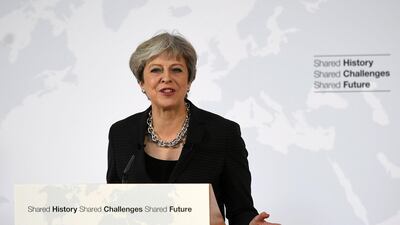British Prime Minister Theresa May has proposed a two-year transitional period after the UK leaves the EU in 2019, to provide businesses and citizens with clarity.
In a keenly-awaited speech to European leaders in Florence on Friday, Mrs May promised that Britain would honour its existing financial commitments during the two-year period, insisting that other EU members should not have to "pay more or receive less".
She also pressed for a unique and sweeping trade deal, offered more legal protections for EU citizens residing in Britain and said there should be deeper security cooperation.
Michel Barnier, the EU's chief Brexit negotiator, gave a cautious welcome to Mrs May's speech, describing it as "constructive" and saying it shows "a willingness to move forward, as time is of the essence".
In a statement, he added that her request for a two-year transitional period "could be taken into account".
_______________
Read more:
Britain's May seeks to unite Cabinet before key Brexit speech
Boris put to the sword by the brothers of the pen
_______________
It is Mrs May’s first major intervention in the Brexit process since triggering the formal withdrawal under Article 50 of the EU treaty in March, and her first roadmap for the departure since a speech at London’s Lancaster House in January.
The speech was widely seen as an attempt by the Prime Minister to break the deadlock in Brexit talks – and unify her divided government – before the negotiations in Brussels restart next week.
As the clock ticks down to withdrawal day on March 29, 2019, the UK badly needs a breakthrough in its discussions with the bloc. Talks have become stuck on the issues of money and citizens’ rights since they began three months ago.
While no actual amount of money was specified, Mrs May stressed that the UK would “honour commitments” that it has already made during its period of EU membership.
It has previously been estimated that the so-called Brexit bill would come to at least €20 billion (Dh87.5bn).
The Prime Minister also issued a personal message to EU citizens in Britain, telling them: “We want you to stay. We value you.”
Outlining her vision for a “time-limited implementation period”, she said it was vital that Britain should be able to access the European single market during this time.
It is the first time that Mrs May has officially committed to a two-year transition period, which is something she said would provide “certainty and clarity to businesses and citizens”.
Mrs May pitched her speech as a direct appeal to the other 27 EU leaders, and will hope that her decision to speak in Florence – a city made wealthy by trade and banking during the Renaissance – will underline her wish for Britain to become a major trading power on its own.
She told European leaders there is a shared responsibility to make Brexit work "smoothly", and that it is “in all of our interests for our negotiations to succeed”.
She added: "The eyes of the world are on us but if we can be imaginative and creative about the way we establish this new relationship... I believe we can be optimistic about the future we can build for the United Kingdom and for the European Union."
_______________
Read more:
Europe should liaise with the UK on security, not ramp up defence to punish it for Brexit
Boris Johnson: the political soap opera that keeps on giving
_______________
In a question-and-answer session after the speech, Mrs May also reiterated her controversial view that "no deal is better than a bad deal".
Earlier this week, Boris Johnson had stoked tension by laying out his own Brexit vision, challenging Mrs May's more cautious approach.
However, the Foreign Secretary was one of the first to applaud the Prime Minister’s speech, describing it as “positive, optimistic and dynamic”. He also praised her for calling for a bespoke deal for the UK, rather than an existing option used by other countries.
Others were less complimentary. In an interview with Sky News, Nigel Farage, the former UKIP leader and one of the architects of Brexit, described the speech as offering “very little substance”.
He added: “Her vision is to leave the EU but in name only, staying part of all the current structures. The most telling line was when she said that we don't seek an unfair competitive advantage. I do, that's what I voted for! Not the leader we need.
“Whatever happens, we won't walk away from the table. I wouldn't be surprised if the two-year transition period becomes a lot longer.”
The most complex set of European negotiations since the end of World War Two have pitted London against Brussels over how to unravel over 40 years of economic and political integration.
EU leaders have expressed frustration at the lack of progress in the talks so far, accusing the British side of a lack of detail and policy direction.
However, the Prime Minister is treading a fine line as she seeks to offer enough to EU negotiators to persuade them to move talks forward, without angering eurosceptics in Britain who have the power to destabilise her minority government.
Mrs May's speech comes at the start of a crucial week for Europe.
On Sunday, German voters are expected to return conservative Chancellor Angela Merkel to power but also vault eurosceptic parties into parliament, including the Alternative for Germany whose nationalist, anti-immigrant ideas echo those of Britain's UKIP.
Two days later, French President Emmanuel Macron is expected to flesh out his ideas for a "relaunch" of the EU and eurozone, underscoring the bloc's determination to press ahead with a closer union that excludes the UK.
The fourth round of Brexit talks is due to begin on September 25, after the last round in August broke up without significant progress.

